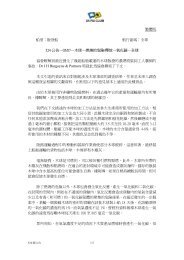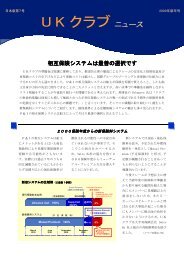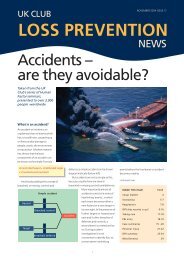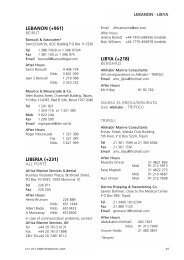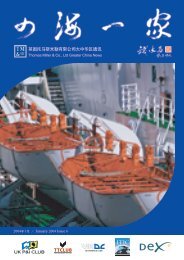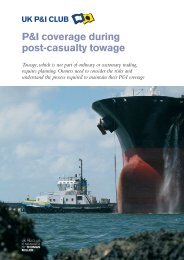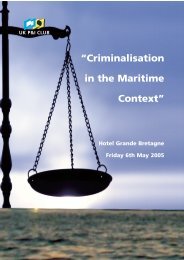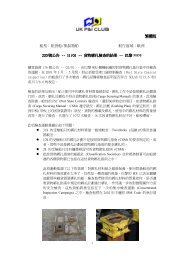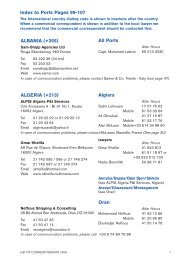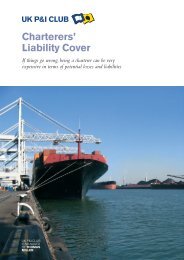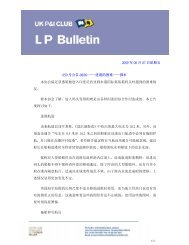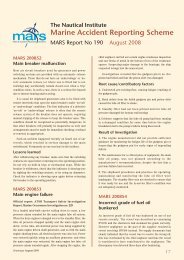Port State Control A/W - UK P&I Members Area
Port State Control A/W - UK P&I Members Area
Port State Control A/W - UK P&I Members Area
- No tags were found...
You also want an ePaper? Increase the reach of your titles
YUMPU automatically turns print PDFs into web optimized ePapers that Google loves.
INTERNATIONAL DEVELOPMENTSISM, STCW AND RESOLUTION A787 (19)THE INTERNATIONAL MANAGEMENT CODE FORTHE SAFE OPERATION OF SHIPS AND FORPOLLUTION PREVENTION (“THE ISM CODE”)Important developments have recently taken place in severalinternational fora which will have a bearing on the operationand implementation of <strong>Port</strong> <strong>State</strong> <strong>Control</strong>.Under the ISM Code, all passenger ships, oil tankers,chemical carriers, gas tankers, bulk carriers and high speedcargo craft of 500gt and above will have to be certified by 1stJuly 1998. For other cargo ships and mobile offshore drillingunits of 500gt and above, enforcement will take effect on 1stJuly 2002.The Code provides for a universal standard of safety andenvironmental protection which is subject to a formal “audit”procedure which must be conducted by qualified auditors inaccordance with internationally agreed criteria.Under the ISM Code and the Safety Management System asafety and environmental protection policy must be formulatedand specific written procedures have to be available aboardeach ship. Non-comformity and accident reporting procedureshave to be established and management review arrangementsdeveloped. Full identification details of the ship’s operatormust be communicated to the flag state.The principal areas in which the ISM Code sets out to applystandards are:<strong>Port</strong> <strong>State</strong> <strong>Control</strong> will be undertaken to verify compliance withthe certification requirements under the ISM Code.Maritime authorities around the world are defining andrefining their approach, and some take a more aggressivestance than others. For example, the secretariat of theEuropean Memorandum of Understanding (the Paris MOU), aregional agreement which encompasses the majority ofEuropean maritime authorities, as well as Canada and theRussian Federation, has stated that it is currently preparing acampaign on inspection of ships and crews under the ISM Code.In the first instance, it can be anticipated that ships which havenot started their certification process will be issued with a letterof warning, and after 1st July 1998 such ships will be detainedfor reasons of non-conformity. Such a detention could be liftedfor a single voyage if no other deficiencies are found, but theship will be refused entry in the same port thereafter, (statedin the Annual Report 1996, of the Paris MOU).In addition, the European Union is taking an interest and hasmade repeated statements to the effect that it intends to ensurethat the ISM Code effective 1st July 1998 will be enforcedby means of enhanced <strong>Port</strong> <strong>State</strong> <strong>Control</strong> inspections. TheEuropean Commission has already warned that if <strong>Port</strong> <strong>State</strong><strong>Control</strong> inspections and detentions fail to keep out substandardships from its jurisdiction then the owners and charterers ofsubstandard ships could face severe financial penalties. In hisaddress to delegates at the Norshipping conference in June●●●Operating ships and transporting cargo safely and efficiently.Conserving and protecting the environment.Avoiding injuries to personnel and loss of life.1997, Mr Roberto Salvarani of the Marine Safety Agency ofthe European Union said shipping had to accept tough policingof existing regulations designed to stamp out what he termedthe culture of evasion.●●●Complying with statutory and rules and requirements, asset out in the applicable International Conventions.Continuous development of skills and systems related tosafe operation and pollution prevention.Preparation of effective emergency response plans.“This is to ensure that quality pays and that the evasion culturedoes not, This means ensuring a real economic return, at leastin the longer term, on operating quality shipping. The role ofgovernments, therefore – to use the example of football – is togive a red card to the bad players. Then and only then will aprice be given to quality. If we can succeed in this we will haveIt is readily apparent from the foregoing that the ISM Codeand the ever increasing and coordinated approach toinspections known generically as <strong>Port</strong> <strong>State</strong> <strong>Control</strong> addressthe same concerns. Since the ISM Code is regarded bymaritime authorities as an important additional tool inimproving the safety consciousness of both shore based andlaid the foundations for industrial self-regulation.”In 1998 inspections in Europe are expected to tighten, first withintense scrutiny of all ISM certificates after the 1st July deadline,focusing on bulk carriers later in the year. Task forces are beingformed to streamline the operation and implementation of<strong>Port</strong> <strong>State</strong> <strong>Control</strong> checks, each with a particular brief.ship based management, it is to be anticipated that stringent4



